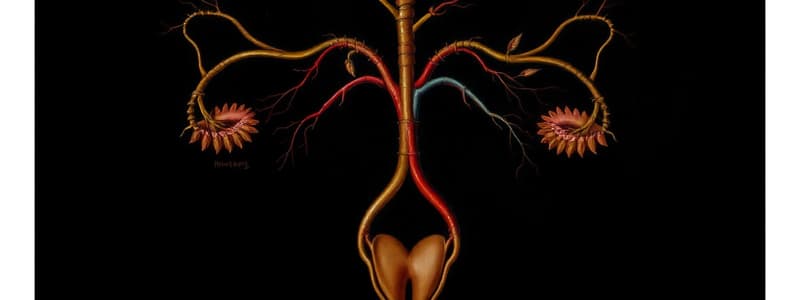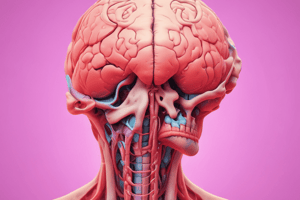Podcast
Questions and Answers
Which of the following statements accurately describes the role of the scrotum in male reproductive health?
Which of the following statements accurately describes the role of the scrotum in male reproductive health?
Which of the following scenarios directly involves the function of the fallopian tubes?
Which of the following scenarios directly involves the function of the fallopian tubes?
Select the correct statement about the role of progesterone in the menstrual cycle.
Select the correct statement about the role of progesterone in the menstrual cycle.
What is the primary function of the parasympathetic nervous system?
What is the primary function of the parasympathetic nervous system?
Signup and view all the answers
Which of the following scenarios is most likely to be affected by a malfunctioning pituitary gland?
Which of the following scenarios is most likely to be affected by a malfunctioning pituitary gland?
Signup and view all the answers
Choose the statement that correctly describes the function of DNA.
Choose the statement that correctly describes the function of DNA.
Signup and view all the answers
What is the primary function of the vas deferens in the male reproductive system?
What is the primary function of the vas deferens in the male reproductive system?
Signup and view all the answers
Which of the following is a nitrogenous base unique to RNA but not present in DNA?
Which of the following is a nitrogenous base unique to RNA but not present in DNA?
Signup and view all the answers
Signup and view all the answers
Flashcards
Thymosin
Thymosin
A hormone produced by the thymus gland that helps produce antibodies.
Growth Hormone
Growth Hormone
A hormone responsible for body growth and development.
Pituitary Gland
Pituitary Gland
The 'master gland' of the endocrine system that regulates other glands.
Scrotum
Scrotum
Signup and view all the flashcards
Fallopian Tubes
Fallopian Tubes
Signup and view all the flashcards
Menstrual Cycle
Menstrual Cycle
Signup and view all the flashcards
Sympathetic Nervous System
Sympathetic Nervous System
Signup and view all the flashcards
DNA Function
DNA Function
Signup and view all the flashcards
Study Notes
Endocrine System
- Thymosin is a hormone produced by the thymus gland, enabling antibody production.
- Growth hormone regulates body growth and development.
- The pituitary gland is the master gland of the endocrine system.
- The scrotum maintains a slightly lower temperature than the body to support sperm production.
- Testes are located outside the body in the scrotum for optimal sperm development at lower temperatures than body temperature.
Reproductive System
- Vas deferens carries mature sperm from the epididymis to the urethra.
- Fallopian tubes are essential for fertilization, as fertilization typically happens here.
- Progesterone levels' fall after ovulation triggers uterine lining shedding (menstruation).
- Fallopian tubes (oviducts) carry eggs from the ovaries to the uterus.
- Estrogen stimulates ovulation and thickens the uterine lining.
- The uterine lining sheds during menstruation due to decreasing estrogen and progesterone levels.
- The menstrual cycle is a 28-day recurring process that prepares the female body for pregnancy.
Nervous System
- The central nervous system includes the brain and spinal cord.
- The brain is the central control center for the nervous system.
- DNA stores genetic information within cells.
- Uracil is a nitrogenous base not found in DNA.
- The sympathetic nervous system prepares the body for "fight or flight" responses through adrenaline release and increased heart rate.
- Rest and digestive functions are primarily controlled by the parasympathetic nervous system.
Studying That Suits You
Use AI to generate personalized quizzes and flashcards to suit your learning preferences.
Related Documents
Description
Test your knowledge on the endocrine and reproductive systems, including hormone functions and the processes involved in human reproduction. Explore key concepts such as hormone production, the role of various glands, and the menstrual cycle.




